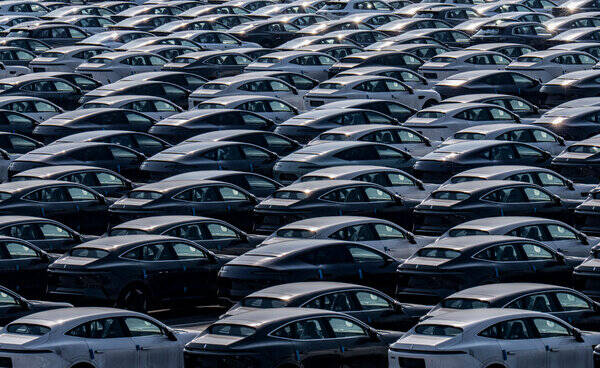纽约时报中文网 - 中英对照版-中英拜登的强硬立场令中国愤怒这说明他做对了
April 1, 2024 5 min 888 words
这篇报道对比了特朗普和拜登两位总统对中国的政策立场,指出拜登的强硬态度让中国感到压力,这也被视为拜登政策的成功。我认同这一观点,拜登政府在贸易、科技出口等问题上的强硬立场,确实对中国形成了一定压力。但同时,我也认为,这并非意味着拜登的对华政策完全正确或无懈可击。这种强硬的策略可能会加剧中美之间的紧张关系,甚至可能引发更大的贸易战。此外,中国对《减少通货膨胀法案》向世界贸易组织提出投诉,也反映出中国不会轻易接受任何形式的不公平待遇。因此,拜登政府在坚持强硬对华政策的同时,也需要考虑如何通过对话和合作,缓解中美关系的紧张。
A persistent theme in Republican campaigning these past few years has been the effort to portray Democrats in general, and President Biden in particular, as being soft on China — in contrast to Donald Trump’s supposed toughness.
过去几年共和党竞选活动的一个持续主题是努力将民主党人(特别是拜登总统)描绘成对中国软弱的形象——与特朗普所谓的强硬形成鲜明对比。
One of the major planks in the G.O.P. case against Biden’s China policies, by the way, was that he was showing his softness by not banning TikTok. This looks ironic now, since Trump, who had favored a ban, suddenly reversed his position, reportedly around the same time that he had a sit-down with a billionaire who donates to Republican campaigns and has a large stake in the Chinese-controlled company.
Even before his TikTok flip-flop, however, the reality was that while Trump talked a xenophobic line that shaded into racism — for example, trying to relabel Covid-19 as the “Chinese virus” — and imposed showy but ineffective tariffs, he never had a coherent strategy for confronting our biggest rival. Biden, on the other hand, has quietly taken a very tough line on trade, especially with China.
然而,即使在特朗普就TikTok问题出尔反尔之前,现实是即便他发表了后来逐渐演变成种族主义的仇外言论——例如,试图将新冠病毒重新贴上“中国病毒”的标签——并征收了声势浩大但不起作用的关税,他也从未有过一个一以贯之的策略来对抗我们最大的对手。另一方面,拜登在贸易问题上不动声色地采取了非常强硬的立场,尤其是在中国的贸易方面。
I’ve been pointing out for a while that Biden’s sophisticated economic nationalism is a very big deal, much more so than Trump’s protectionist thrashing. In fact, Biden’s policies are so tough on China that, while I support them, they make me a bit nervous. But in case you don’t believe what I’m saying, let me point to someone who apparently agrees with me: the Chinese government.
一段时间以来,我一直在指出,拜登复杂成熟的经济民族主义是一件非常重要的事情,比特朗普的保护主义猛烈打击要重要得多。事实上,拜登对中国的政策已经强硬到让我感到有点紧张,尽管我是支持它们的。但如果你不相信我所说的话,那么有一方显然会同意我的观点:中国政府。
China just filed a complaint with the World Trade Organization about the Inflation Reduction Act, which, despite its name, is at its core an attempt to fight climate change by subsidizing the transition to a low-emission economy. Specifically, China complained about electric vehicle subsidies that it says unfairly discriminate against production using car battery components made in China.
中国刚刚向世界贸易组织提出了关于《减少通货膨胀法案》的投诉,尽管该法案的名称如此,但其核心是试图通过补贴向低排放经济转型来应对气候变化。具体来说,中国抱怨的是电动汽车补贴,中国称这对使用中国产汽车电池组件的汽车生产进行了不公平的歧视。
Honestly, I didn’t see that coming. America’s new industrial policy does favor domestic production and — we’ll see — might be in violation of W.T.O. rules. But for China, of all countries, to complain about targeted subsidies is an act of colossal chutzpah.
老实说,这是我没有料到的。美国的新产业政策确实有利于美国国内生产,而且——我们等着看看吧——可能违反了世贸组织的规定。但这么多国家里,偏偏中国要抱怨定向补贴,这是一种极其厚脸皮的行为。
China spends vast sums on subsidies for favored companies, far more so than any other major economy. And it has often engaged in blatantly discriminatory policy — for example, for several years, until 2019, non-Chinese companies were essentially prevented from supplying electric vehicle batteries to Chinese car manufacturers.
It’s also unclear what China hopes to achieve with this complaint. In 2022, the W.T.O. ruled that U.S. tariffs on steel and aluminum, imposed under Trump but retained under Biden, were illegitimate. The Biden administration responded by, in effect, telling the organization to take a hike.
The administration would surely do the same in defending subsidies that aren’t just Trump legacies, but rather a key element of its climate strategy — an attempt to make a transition to green energy politically feasible by linking that transition to job creation. The buy-American provisions may make this climate strategy more costly — but without them the I.R.A. may never have become law.
拜登政府肯定会采取同样的做法来捍卫补贴,这不仅是特朗普的遗产,也是其气候战略的关键要素——试图通过将转型与创造就业机会联系起来,使向绿色能源的转型在政治上变得可行。购买美国货的条款可能会使这一气候战略的成本更高——但如果没有这些条款,《减少通货膨胀法案》可能永远不会成为法律。
Biden officials have made it clear that they won’t allow Chinese exports to sever the link between climate policy and job creation. On Wednesday, Treasury Secretary Janet Yellen warned China about the “overcapacity” it is developing in green energy as a result of subsidies. Given this, it’s hard to imagine that the administration would accept a ruling against its own subsidies, even if China manages to win its case.
拜登政府官员已明确表示,他们不会允许中国出口切断气候政策与创造就业之间的联系。周三,财政部长珍妮特·耶伦警告中国称,由于补贴,中国在绿色能源领域出现“产能过剩”。鉴于此,即使中国成功胜诉,也很难想象美国政府会接受针对自己补贴的裁决。
So what is the Chinese government really doing here? I guess it’s possible that there’s some deeper strategy at play, although I have no idea what that might be. A more likely explanation is that Chinese officials are simply lashing out — perhaps in response to demands from the top that they do something — because they’re feeling the pressure from Biden’s policies.
那么中国政府到底在做什么呢?我想可能有一些更深层次的策略在起作用,尽管我不知道那会是什么。更可能的解释是,中国官员只是在发脾气——也许是为了回应高层要求他们采取行动的要求——因为他们感受到了拜登政策的压力。
These policies go far beyond electric vehicle subsidies, although they are the current flashpoint. The U.S. is also promoting semiconductor production, in part to reduce dependence on China. And the Biden administration has imposed stiff limits on technology exports to China, with the clear goal of crimping Chinese technological progress in advanced semiconductors and computing. As I said, Biden’s China policy is so tough that it makes me, someone who generally favors a rules-based system, nervous, although unlike many economists — who, I’d argue, don’t fully grasp how the world has changed — I do believe it’s the right approach.
It’s understandable that all of this seems to make China’s leaders angry. But that’s OK. It suggests that Biden’s approach is working.
所有这一切似乎让中国领导人感到愤怒,这是可以理解的。但没关系。这表明拜登的做法正在起作用。
And when it comes to domestic politics, note the contrast. Trump made a big show of taking on China, but he was ineffective when in office and appears to have folded on TikTok when donor money was at stake. Biden talks more softly but is wielding a really big stick. Or to put it another way, Trump isn’t actually a tough guy on China; he just plays one on TV. Biden is the real deal.
当谈到国内政治时,请注意对比。特朗普大张旗鼓地展示了与中国的对抗,但他在任期间并未带来实际效果,而且在事关捐款时,他在TikTok这件事上似乎已经弃牌。拜登说话比较温和,但挥舞着一根大棒。或者换句话说,特朗普对中国其实并不是一个强硬的人,他只是在电视上表演强硬。拜登是来真的。
Naturally, this won’t stop Republicans from claiming that Biden is soft on China. But he isn’t. And by filing this complaint with the W.T.O., the Chinese government has demonstrated that it knows what’s really going on.
当然,这并不能阻止共和党人声称拜登对中国态度软弱。但他并非如此。通过向世贸组织提出申诉,中国政府表明它完全明白现在到底什么情况。

